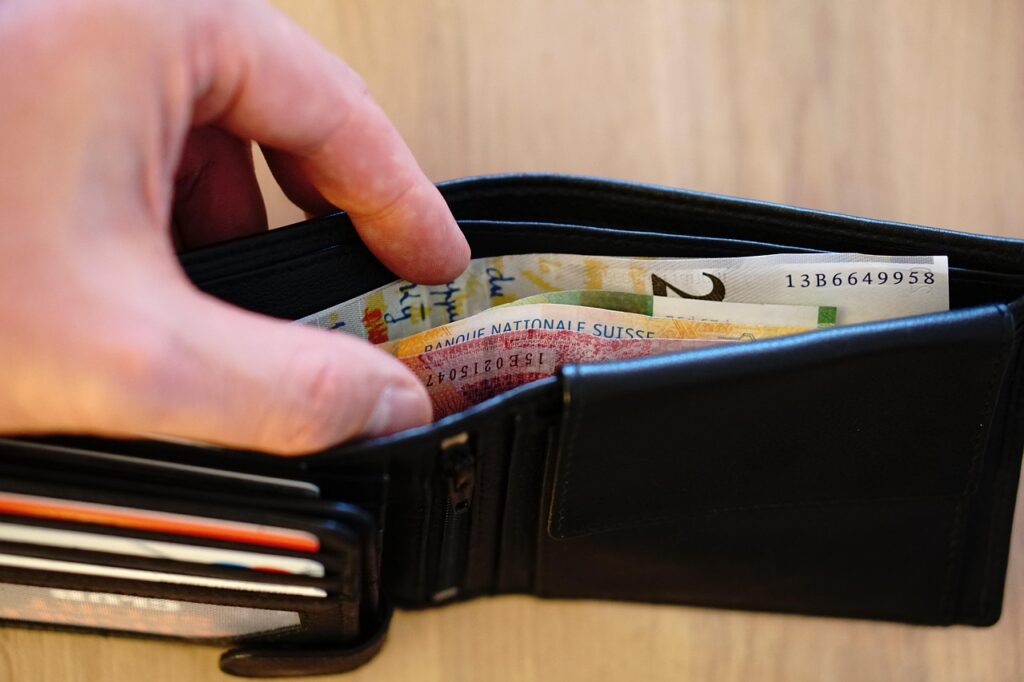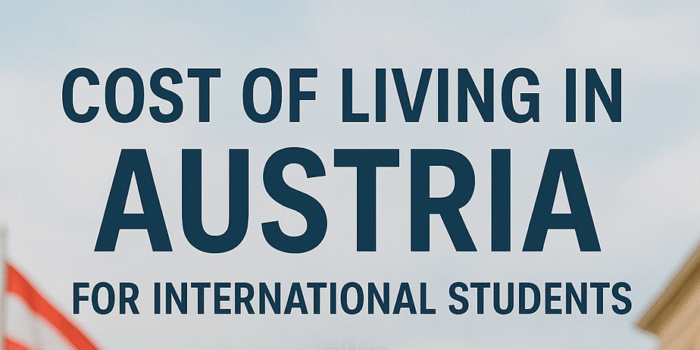Planning to study in Austria in 2025? One of the first things you’ll want to figure out is how much is actually the cost of living in Austria as an international student. After all, knowing your monthly expenses ahead of time helps you focus on your studies rather than worrying about money.
The good news? Austria combines high-quality education with a relatively affordable cost of living, especially compared to many Western European countries like Germany or France. Whether you’re headed to Vienna, Salzburg, Graz, or Innsbruck, careful budgeting can help you enjoy student life without breaking the bank.
In this guide, we’ll break down all the major monthly expenses, rent, food, transportation, health insurance, and more-so, you can plan your finances confidently.

Table of Contents
Average Monthly Cost of Living in Austria for Students
Your total monthly expenses will depend on three main factors:
- City of residence: Big cities like Vienna and Salzburg cost more than smaller towns like Graz.
- Type of accommodation: Dormitories are cheaper than private apartments.
- Lifestyle choices: Eating out frequently and traveling often will naturally increase costs.
Here’s a city-wise breakdown of typical student expenses in 2025:
City-wise Cost Comparison Table
| City | Accommodation (EUR) | Food (EUR) | Transport (EUR) | Total Monthly Cost (EUR) |
| Vienna | 300–600 | 200–300 | 30–78 | 900–1,300 |
| Salzburg | 280–550 | 200–280 | 30–60 | 900–1,200 |
| Graz | 260–500 | 180–250 | 30–55 | 850–1,000 |
| Innsbruck | 280–520 | 190–260 | 30–60 | 870–1,050 |
Key Insight: Smaller cities like Graz and Innsbruck tend to be more affordable than Vienna, especially when it comes to rent and daily expenses.
Complete Student Budget Planner for Austria
To help you plan better, here’s a category-wise monthly expense guide:
| Expense Category | Estimated Cost (EUR) |
| Accommodation | 260–600 |
| Food & Groceries | 200–300 |
| Public Transport | 30–78 |
| Health Insurance | 60–70 |
| Study Materials | 20–50 |
| Phone & Internet | 20–30 |
| Leisure & Social Life | 100–200 |
So, if you’re living in a shared flat, cook at home, and use student discounts, your total monthly budget can stay below €1,000 in most Austrian cities.
Detailed Breakdown of Monthly Expenses
Let’s look at each expense in more detail so you can see where your money will go.
Accommodation Costs
Accommodation is usually the biggest expense for international students in Austria. Your options include:
- Student Dormitories (260 – 450 EUR/month): Managed by organizations like OeAD, they are the most affordable option, especially for first-year students. Many include utilities and internet in the rent.
- Shared Apartments (WG): Cost between €350 – €600/month depending on location. A great way to save money and make friends.
- Private Apartments: Solo living can be expensive, with rents starting from €600/month and going much higher in Vienna city center.
Pro Tip: Apply early for dorms as spots fill up quickly before the semester begins.
Food and Groceries
On average, students spend €200 – €300/month on food. You can keep costs low by:
- Shopping at discount supermarkets like Hofer, Lidl, and Spar
- Eating at university canteens (Mensa) where meals cost only €4–€6
- Cooking at home rather than eating out frequently
If you like dining out, expect to pay:
- €7–€12 for a simple meal at a cheap restaurant
- €20–€30 per person for a three-course meal at a mid-range restaurant

Public Transportation
Austria’s public transport system is efficient and student-friendly:
- Vienna Semester Ticket: ~€78 for the whole semester (4–5 months)
- Monthly Ticket in Smaller Cities: €30–€60 depending on the location
- Biking is popular and free many students use it for daily commuting
Health Insurance
Health insurance is mandatory for all international students. The public student health insurance (ÖGK) costs around €70.79/month in 2025.
This covers doctor visits, hospitalization, and emergency care. Private insurance is available but often more expensive.
Study Materials and Internet
- Books and study materials cost €20 – €50/month on average, though many universities offer free digital resources.
- Phone and internet packages cost about €20 – €30/month. Providers like A1, Hot, Drei, and Magenta have student-friendly plans.
Leisure and Social Life
Austria has a vibrant student culture with countless events, museums, and nightlife activities. A night out with friends or a weekend trip might cost €100 – €200/month depending on your interests.
Movie tickets cost about €11, coffee about €3, and beer between €2–€4. With a student ID, you’ll enjoy discounts at gyms, theaters, and cultural venues.

Tips to Save Money as a Student in Austria
Studying abroad can be expensive, but these tips can help keep your costs under control:
- Use Student Discounts Everywhere: Transport, restaurants, museums—always carry your student ID.
- Live in Shared Flats or Dorms: Splitting rent and utilities can save you hundreds of euros each month.
- Cook at Home: It’s cheaper and healthier than eating out regularly.
- Buy Second-Hand Books: Many student groups resell books at discounted prices.
- Track Your Expenses: Apps like N26, Revolut, or Mint help you stay on budget.
- Consider Part-Time Jobs: Non-EU students can work up to 20 hours/week during the semester.
Summary of the Cost of Living in Austria for International Students
🏠 Accommodation
- University Dormitory: €260 – €450/month
- Shared Apartment (WG): €350 – €600/month
- Private Apartment: €600 – €850/month
🍽️ Food & Groceries
- Groceries: €200 – €300/month
- University Canteen Meal: €4 – €6 per meal
- Cheap Restaurant Meal: €7 – €12 per meal
- Mid-Range Restaurant Meal: €20 – €30 per meal
🚍 Public Transportation
- Vienna Semester Ticket: €78/semester
- Small City Monthly Ticket: €30 – €60
- Biking (one-time purchase): €20 – €50
🎉 Leisure & Social Life
- Weekend Trips: €100 – €200/month
- Movie Ticket: €11
- Coffee: €3
- Beer: €2 – €4
📚 Study Materials & Internet
- Books & Study Materials: €20 – €50/month
- Phone & Internet Package: €20 – €30/month
🏥 Health Insurance
- Public Student Health Insurance (ÖGK): €66.79/month
Final Thoughts
Studying in Austria offers a perfect balance of quality education, cultural experiences, and affordable living costs. With a monthly budget of €900–€1,300, you can live comfortably in most Austrian cities while enjoying everything from skiing trips to classical music concerts. By choosing budget-friendly housing, using student discounts, and planning meals wisely, you’ll have plenty of room in your budget for leisure and travel too.
So, start planning today—Austria’s academic and cultural opportunities await!
FAQs: Cost of Living in Austria for International Students
1. How much does it cost to live in Austria as a student in 2025?
On average, international students spend between €900 and €1,300 per month in Austria. This covers accommodation, food, transport, insurance, study materials, and leisure. Costs are higher in cities like Vienna and Salzburg, while Graz and Innsbruck are slightly more affordable.
2. Is Austria cheaper than other Western European countries for students?
Yes. Austria is considered one of the more affordable study destinations in Western Europe. Tuition fees are lower and living costs are more manageable compared to countries like Germany, France, or the Netherlands.
3. How much does student housing cost in Austria?
Accommodation is usually the largest expense.
Dormitories: €260–€500/month
Shared flats: €370–€600/month
Private studios: €600–€800/month
Vienna tends to be the most expensive city for housing.
4. What are average food and grocery costs in Austria?
Students typically spend €200–€300/month on groceries. Cooking at home and shopping at affordable supermarkets like Hofer, Lidl, or Spar helps keep costs low. Eating out at a student canteen (Mensa) costs only €7–€12 per meal.
5. How much is public transportation for students in Austria?
Students benefit from discounted travel passes:
Vienna Semester Ticket: ~€78 for 4–5 months
Monthly passes in other cities: €30–€60
Cycling is also a popular, free alternative
6. Do international students need health insurance in Austria?
Yes. Health insurance is mandatory. Public student health insurance (ÖGK) costs about €66–€75 per month and provides full medical coverage during your studies.
7. What additional costs should students expect?
Study materials: €20–€50/month
Phone & internet: €20–€30/month
Leisure & social life: €100–€200/month
Students also enjoy discounts at museums, cinemas, gyms, and cultural events with an ISIC or ÖH-card.
8. Can international students work part-time in Austria?
Yes. Non-EU/EEA students with a residence permit “Student” can work up to 20 hours per week during the semester. Popular jobs include tutoring, barista work, social media support, and retail.
9. Are scholarships available to reduce costs in Austria?

Absolutely. International students can apply for funding such as the Ernst Mach Grants, Erasmus+, CEEPUS, and university-specific scholarships, which can significantly lower tuition and living expenses.
10. What’s the cheapest Austrian city to live in as a student?
Graz and Linz are generally cheaper compared to Vienna or Salzburg. Students in Graz, for example, spend about €900–€1,000 per month, while Vienna student budget closer to €1,100–€1,300.


